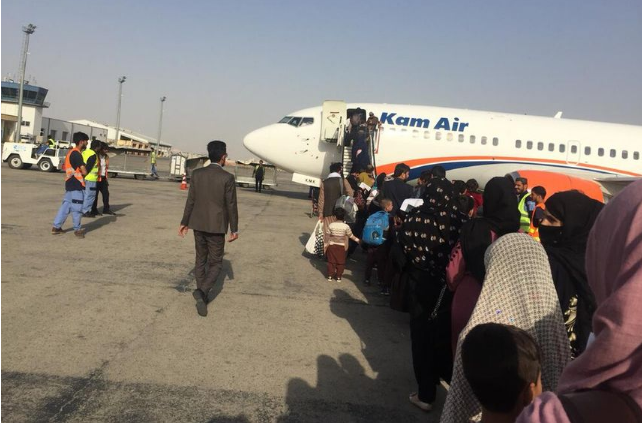Hundreds of Afghans have been forced to leave safe houses in Afghanistan after the volunteer group trying to help them evacuate failed to negotiate their passage out of the country and ran out of money to support them, the group said Thursday.
The Afghans include U.S. citizens, legal permanent residents, former U.S. government workers and others who worked on U.S. funded projects, and their families. They have been told to return to their homes or to fund their own accommodation in hope of a future flight, the group, Task Force Argo, said.
Since the last U.S. forces left Afghanistan at the end of August, charter flights operated by volunteer groups have offered vulnerable Afghans one of the few routes out of the country.
Task Force Argo was one of the biggest volunteer groups, made up of current and former U.S. government officials, veterans and others working to charter evacuation flights out of Afghanistan. The group’s leaders said it has three flights ready to leave but nowhere to land the planes because the U.S. government hadn’t approved the passenger manifests or otherwise cleared the departures.
The group said it had raised nearly $2 million from veterans and other private donors and gets no U.S. government money. Donations streamed in during the chaotic evacuation from Kabul but have fallen off since media coverage of the issue has diminished.
A spokeswoman said that several countries already hosting Afghans temporarily—Albania, Kosovo, Rwanda and Uganda—had offered to receive the passengers but only with the U.S. government’s approval.
Task Force Argo said that it had waited weeks for a response from the State Department and that it had run out of money to house the people hoping to fly out.
“It’s astronomical,” said the spokeswoman, who also holds a position with the U.S. government. “We are just volunteers.”
The State Department said it has concerns about the accuracy of volunteer groups’ passenger manifests because it lacks personnel on the ground to vet the lists.
A spokesman for the department said that in the past, some passengers on private flights had turned out to be ineligible for relocation to the U.S., “despite the best efforts of the private organizations supporting these charters.”
“This puts the individual travelers at risk with no plan for relocation to the United States; damages the bilateral relationship of the United States with the destination countries; and makes it more difficult for the U.S. government to rely on those partner countries to assist in future relocations out of Afghanistan,” the spokesman said.
Task Force Argo said that it has helped more than 2,000 people leave Afghanistan at no cost to evacuees, including Americans, residents and visa holders. Most are in the United Arab Emirates, awaiting transfer to the U.S. or other countries, depending on their eligibility.
Another volunteer group helping to charter flights out of Afghanistan, led by the U.S. development firm Sayara International, said it also has been unable to get approval from the State Department for its passenger manifests.
The department has said that Afghans who worked for U.S. contractors, U.S. media or projects funded by the U.S. may apply for refugee status if they can get to a third country. For many such Afghans, the volunteer groups offer the only hope of leaving the country to do so.
The State Department said it is working alongside a humanitarian partner on the ground to secure seats on flights for those eligible for evacuation. Only American citizens, legal permanent residents and immediate family members are able to get seats, with very limited exceptions.
That leaves behind tens of thousands of Afghans who have applied for visas based on their work for the U.S. and the risks they face under the Taliban government, according to advocates, veteran groups and lawmakers.
Since the Taliban seized power in August, isolated reports have emerged of reprisal killings and efforts to hunt down enemies, but widespread massacres that were feared in the West haven’t happened.
Some former members of Afghanistan’s U.S.-trained intelligence service and elite military units, now abandoned by their American patrons and hunted by the Taliban, have enlisted in the only force currently challenging the country’s new rulers: Islamic State.
Afghan women are already disappearing from view, with secondary schools for girls in much of the country closed and most women told to stay away from the workplace.
The Taliban leadership has said that the movement respects women’s rights, within what it sees as the correct framework of Islam. The government, intent on wooing the international community and gaining recognition from foreign capitals, hasn’t formally changed laws to significantly curb women’s freedoms.
In practice, however, women’s rights have deteriorated sharply, women and human-rights groups have said, in part because the Taliban’s central leadership exercises limited authority over individual members, who enforce their own views of what they consider proper Islamic behavior and traditional norms.








































admin in: How the Muslim Brotherhood betrayed Saudi Arabia?
Great article with insight ...
https://www.viagrapascherfr.com/achat-sildenafil-pfizer-tarif/ in: Cross-region cooperation between anti-terrorism agencies needed
Hello there, just became aware of your blog through Google, and found ...